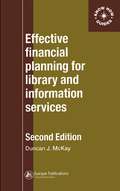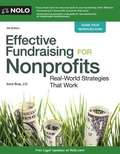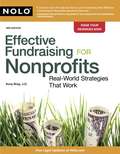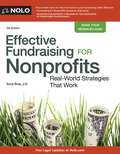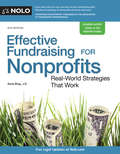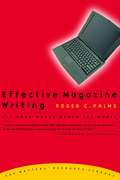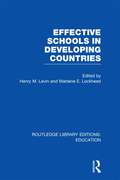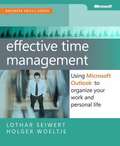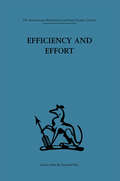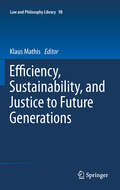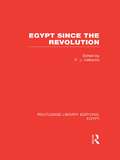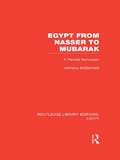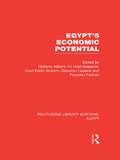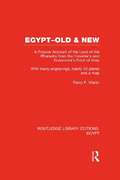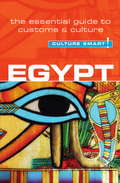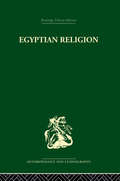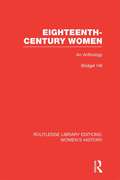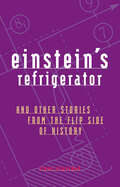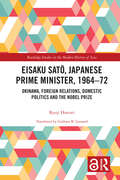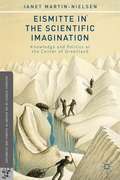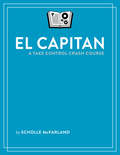- Table View
- List View
Effective Ecology: Seeking Success in a Hard Science
by Roger D. CousensEcology is one of the most challenging of sciences, with unambiguous knowledge much harder to achieve than it might seem. But it is also one of the most important sciences for the future health of our planet. It is vital that our efforts are as effective as possible at achieving our desired outcomes. This book is intended to help individual ecologists to develop a better vision for their ecology – and the way they can best contribute to science. The central premise is that to advance ecology effectively as a discipline, ecologists need to be able to establish conclusive answers to key questions rather than merely proposing plausible explanations for mundane observations. Ecologists need clear and honest understanding of how we have come to do things the way we do them now, the limitations of our approaches, our goals for the future and how we may need to change our approaches if we are to maintain or enhance our relevance and credibility. Readers are taken through examples to show what a critical appraisal can reveal and how this approach can benefit ecology if it is applied more routinely.Ecological systems are notable for their complexity and their variability. Ecology is, as indicated by the title of this book, a truly difficult science. Ecologists have achieved a great deal, but they can do better. This book aims to encourage early-career researchers to be realistic about their expectations: to question everything, not to take everything for granted, and to make up their own minds.
Effective Financial Planning for Library and Information Services
by Duncan McKay Duncan MckayThis title is a concise guide to financial planning, with definitions of financial terms and the key processes involved, which also provides tips on how to present your budget most effectively to secure funding. As pressures of business increasingly affect all information functions, it has become ever more important to be able to justify the costs involved in running any form of information function. This second edition covers budgetary implications related to developments in information source provision.
Effective Fundraising for Nonprofits
by Ilona BrayGetting tax exempt status for your nonprofit organization is just the first step toward succeeding in your mission ultimately, your nonprofit's effectiveness depends entirely on your ability to raise money. Effective Fundraising for Nonprofits will show you how. Featuring advice and stories from over 40 experienced fundraisers, foundation staffers, journalists, and more, this edition of Effective Fundraising for Nonprofits offers strategies for raising donations from individuals, companies, and institutions, and covers the tools and staff you'll need to get the job done. Find out how to: -work with individual donors -analyze the donor base -plan special events -solicit grants from foundations and corporations -get media coverage -use the Web to further fundraising goals -start a side business to raise funds Best of all, Effective Fundraising for Nonprofits contains expert advice written in plain English, cutting out the jargon and "consultant speak" that's all too common in many nonprofit books. The new edition covers the latest wisdom on online fundraising, including using social networking for fundraising and tips on dealing with the down economy. And you can read up on latest studies on who gives the most and why and the latest tips for "greening" your nonprofit's special events. Plus, you'll get the latest tax figures, guidelines for the new IRS Form 990, and updated resource recommendations and contact information.
Effective Fundraising for Nonprofits
by Ilona Bray J.D.Getting tax-exempt status for your nonprofit organization is just the first step -- whether its mission will succeed depends entirely on your ability to raise money. Fortunately, Effective Fundraising for Nonprofits will show you how. Featuring advice and stories from over 40 experienced fundraisers, foundation staffers, journalists and more, the 2nd edition of Effective Fundraising for Nonprofits explains how to: work with individual donors plan special events solicit grants from foundations and corporations get media coverage use the Web to further fundraising goals start a side business to raise funds and much more The 3rd edition is updated to reflect the latest studies on who gives the most and why. It also contains new tax figures, the new IRS Form 990, updated resource recommendations and contact information and offers tips for "greening" one's special events.
Effective Fundraising for Nonprofits: Real-World Strategies That Work
by Ilona BrayGetting tax-exempt status for your nonprofit organization is just the first step toward succeeding in your mission -- ultimately, your nonprofit's effectiveness depends entirely on your ability to raise money. Effective Fundraising for Nonprofits will show you how. Featuring advice and stories from over 40 experienced fundraisers, foundation staffers, journalists, and more, this edition of Effective Fundraising for Nonprofits offers strategies for raising donations from individuals, companies, and institutions, and covers the tools and staff you'll need to get the job done. Find out how to: work with individual donors analyze the donor base plan special events solicit grants from foundations and corporations get media coverage use the Web to further fundraising goals start a side business to raise funds Best of all, Effective Fundraising for Nonprofits contains expert advice written in plain English, cutting out the jargon and "consultant speak" that's all too common in many nonprofit books. This easy-to-read book combines the author's legal and fundraising experience with advice and stories from over 50 experienced fundraisers. Offers practical guidance on all the forms of fundraising that a new or small to mid-size nonprofit will need, including working with individual donors, planning special events, soliciting grants from foundations and corporations, getting media coverage, using the Web and social media, and much more. Includes handy worksheets and sample letters.
Effective Fundraising for Nonprofits: Real-World Strategies That Work
by Ilona BrayJump start your fundraising efforts! Whether your nonprofit has just gotten tax-exempt status or has been operating for years, its success or failure depends on its ability to raise donations from individuals, companies, and institutions. The question you’re facing is, “How do we make our voices heard and bring in the needed support?” Here, you’ll find plain-English answers. Featuring advice and stories from over 50 experienced fundraisers, foundation staffers, journalists and more, this book explains how to: make a fundraising plan work with individual donors keep givers giving plan special events solicit grants from foundations and corporations use traditional and social media to engage supporters start a side business to raise funds and much more. Effective Fundraising for Nonprofits also provides creative grassroots strategies and dozens of real-life success stories. Best of all, it cuts out the jargon and “consultant speak” that’s all too common in nonprofit books. The 6th edition is completely updated with new stories and samples, the latest IRS rules and regulations, and the latest communication strategies.
Effective Magazine Writing: Let Your Words Reach the World
by Roger PalmsLet your words reach the WorldIf you are a writer who wants to have an impact with your words in the Christian magazine market, this book is for you. The former editor of Decision magazine, Palms helps you take stock of your gifts and use the to creatively minister to others. Giving a clear understanding of each step in the magazine process, Palm describes how to work with editors, write a query letter, and conduct interviews. He demonstrates how to find ideas, develop each draft, and overcome problems with grammar, tenses, story line, and voice. The book also addresses the ethical and legal side of writing, as well as understanding the diversity of readers in our every-changing culture.From the Trade Paperback edition.
Effective Schools in Developing Countries (Routledge Library Editions: Education #Vol. 15)
by Henry M. LevinThis volume brings together eight case studies which describe a variety of initiatives to create more effective schools for children of poverty, especially in the Third World. The initiatives reviewed published and unpublished documents and both qualitative and statistical studies were examined. Countries include Brazil, Burundi, Colombia, Ghana, Nepal, Sri Lanka, Thailand and the United States. Each initiative was developed independently to address unique challenges and situations but taken as a group, the features of the approaches described in this volume can be viewed as a basis for considering the development of effective schools strategies in other contexts.
Effective Time Management: Using Microsoft® Outlook® to Organize Your Work and Personal Life
by Lothar Seiwert Holger WoeltjeTake charge--and create an effective balance between your work and personal life with the help of Microsoft Outlook. In this practical guide, two experts teach you a proven time-management system, showing you how to set and manage your priorities with custom modifications to Outlook. Sharpen your focus, combat distractions--and manage your time with complete confidence. Get the skills to take control of your schedule Organize email in a systematic way and keep your inbox clean Schedule time for productivity--and defend it against interruptions Apply Outlook filters to help you manage tasks and projects Make time for family and fun--plan your work and private lives together Use Outlook with Microsoft OneNote® to capture ideas and set goals Learn effective time management techniques with practical examples
Effective Treatments in Psychiatry
by Peter Tyrer Kenneth R. SilkTyrer (community psychiatry, Centre for Mental Health Imperial College, London, UK) et al. present this pocket (7x5") reference to effective psychiatric treatments. Covering a full range of disorders from schizophrenia and substance abuse disorders to anxiety and sexual identity disorders, this pocket reference provides brief information on each disorder as well as effective treatments. Drawing from the most recent psychiatric consensus, the material will be highly useful as an and up-to-date treatment reference for both psychiatry students and practitioners. Annotation ©2012 Book News, Inc. , Portland, OR (booknews. com)
Efficiency and Effort: An analysis of industrial administration
by W BaldamusTavistock Press was established as a co-operative venture between the Tavistock Institute and Routledge & Kegan Paul (RKP) in the 1950s to produce a series of major contributions across the social sciences. This volume is part of a 2001 reissue of a selection of those important works which have since gone out of print, or are difficult to locate. Published by Routledge, 112 volumes in total are being brought together under the name The International Behavioural and Social Sciences Library: Classics from the Tavistock Press. Reproduced here in facsimile, this volume was originally published in 1961 and is available individually. The collection is also available in a number of themed mini-sets of between 5 and 13 volumes, or as a complete collection.
Efficiency, Sustainability, and Justice to Future Generations
by Klaus MathisFifty years after the famous essay "The Problem of Social Cost" (1960) by the Nobel laureate Ronald Coase, Law and Economics seems to have become the lingua franca of American jurisprudence, and although its influence on European jurisprudence is only moderate by comparison, it has also gained popularity in Europe. A highly influential publication of a different nature was the Brundtland Report (1987), which extended the concept of sustainability from forestry to the whole of the economy and society. According to this report, development is sustainable when it "meets the needs of the present without compromising the ability of future generations to meet their own needs". A key requirement of sustainable development is justice to future generations. It is still a matter of fact that the law as well as the theories of justice are generally restricted to the resolution of conflicts between contemporaries and between people living in the same country. This in turn raises a number of questions: what is the philosophical justification for intergenerational justice? What bearing does sustainability have on the efficiency principle? How do we put a policy of sustainability into practice, and what is the role of the law in doing so? The present volume is devoted to these questions. In Part One, "Law and Economics", the role of economic analysis and efficiency in law is examined more closely. Part Two, "Law and Sustainability", engages with the themes of sustainable development and justice to future generations. Finally, Part Three, "Law, Economics and Sustainability", addresses the interrelationships between the different aspects.
Egypt Since the Revolution (Routledge Library Editions: Egypt)
by P. J. VatikiotisAs the leaders of a revolutionary, nationalist regime, the Egyptian Free Officers who came to power following the 1952 Revolution committed themselves to the attainment of goals associated with modernization, namely rapid economic development based on State planning and industrialization and the political mobilization of society along State-decreed lines. Arising from a conference held at the Centre of Middle Eastern Studies at SOAS, with contributions from scholars from the Arab world, Europe and the US as well as the UK, these papers raise the questions most important to students of economic and political development.
Egypt from Nasser to Mubarak: A Flawed Revolution (Routledge Library Editions: Egypt)
by Anthony McDermottEver since Nasser overthrew Prince Farouk in 1952, Egypt has held a special, leading position within the Arab world. It is now facing major problems, the most serious of which are the growing strength of the Muslim fundamentalists, continuing population growth and external debt problems. Together, these are creating a volatile and potentially explosive climate. In this book, the journalist Anthony McDermott examines the development of Egypt from Revolution to the present, describing various features of Egyptian society and the contributions of its leaders. He asks whether Egypt has fulfilled its expected role as the model for Arab and developing countries or whether the peace pact made by Sadat with Israel was a major error, causing Egypt’s withdrawal under Mubarak from the centre of international politics. The book is lively and readable and provides a challenging introduction to the development and problems of the largest country in the Middle East. First published 1988.
Egypt's Economic Potential (Routledge Library Editions: Egypt)
by Roberto AliboniOver the last ten years the Egyptian economy has undergone a major transformation which has led to greater decentralisation and international competition. This transformation, along with changing circumstances in the surrounding Arab areas and the end of hostilities with Israel, has given a boost to the Egyptian economy. Without underestimating the obstacles that still stand in the way of sustained economic growth and development, this book foresees a more optimistic outlook for Egypt than do other such studies carried out by international organisations such as the World Bank. Egypt’s Economic Potential argues that the main problem facing the Egyptian economy is that the government must resort to expensive public expenditure policies, in particular subsidising foodstuffs, in order to maintain the political consensus. This creates a savings gap which prevents the authorities from channelling savings towards financing the projects which will cerate economic growth. However, the book suggests that because the present regime is fundamentally stable and even further change at the top would be unlikely to alter the institutional framework of the country, the Egyptian economy has the potential for stable and rapid growth.
Egypt, 1798-1952: Her Advance Towards a Modern Identity (Routledge Library Editions: Egypt)
by J.C.B. RichmondEgypt was the first of the Arab-speaking Muslim countries to come into close contact with modern European states. The experience was not a particularly happy one. It resulted in political and economic subjugation and in the breakdown of her traditional culture and society: but it led also to her emancipation from the Ottoman Empire and to the eventual development of a modern and autonomous Egyptian identity. The central aim of this book is to trace the history of Egypt during this period of change, from Napoleon’s invasion at the end of the eighteenth century to the Free Officer’s Revolution in the middle of the twentieth. The author describes the effects of European – particularly British and French – involvement on the course of Egyptian history, shown variously for example in her changing trade pattern, in her forced participation in two world wars and in the planning and construction of the Suez Canal. One of these effects was to stimulate the development of Egyptian nationalism and the emergence of her own leaders. A major factor in the course of Egyptian history, and one of which the author is constantly aware, was the European ignorance of Islamic and Arabic thought and attitudes, which was largely responsible for the misunderstandings and conflicts which characterized the period. The book provides a valuable analysis of interaction between communities with different and sometimes opposing value systems. To understand this interaction is essential to the study of the history, politics and culture of the Middle East.
Egypt, Old and New: A popular account. With many engravings, nearly 50 coloured plates and a map (Routledge Library Editions: Egypt)
by Percy Falcke MartinA work of history, culture, politics, economics, packed with period photographs and period insights.
Egypt: Culture Smart!
by Jailan ZayanThe best-selling Culture Smart! series continues where other guides leave off. Whether you are travelling on business or pleasure, long-term or short, Culture Smart! is your pocket-sized cultural roadmap that never goes out of date. Providing essential information on attitudes, beliefs and behaviour in different countries, these concise guides enable you to steer clear of embarrassing mistakes, feel confident in unfamiliar situations, and arrive at your destination with local knowledge on what to expect and how to behave. Culture Smart! has become as essential as remembering to pack your passport. Be a responsible traveller with Culture Smart!, the smarter way to travel.
Egyptian Relgion (Anthropology and Ethnography)
by Siegfried MorenzIntroducing the reader to the gods and their worshippers and to the ways in which they were related, this book focuses on the ever-present link between the human and the divine in Ancient Egypt. The book also examines the impact of Egyptian religion upon the Judaeo-Christian world. First published in 1973.
Eighteenth-century Women: An Anthology (Routledge Library Editions: Women's History)
by Bridget HillWhen it was first published in 1984, this book filled an acknowledged gap in the social history of the period and made available hitherto inaccessible sources. The work draws on newspapers and journals, memoirs, diaries, courtesy books, county surveys and records, but also on the literature of the period, its novels, poetry and plays. It examines the role assigned to women in eighteenth-century society and the education thought fitting to perform it. It looks at attitudes to courtship and marriage, chastity and sexual passion. It explores the role of women as wives and mothers, as spinsters and widows, and focuses on the living and working experience of women whether in the home, agriculture, industry or domestic service. It contrasts the expectations of the rich and the poor, the leisured lady and the underpaid female agricultural labourer, the unmarried mother and the prostitute.
Einführung in die moderne Strafrechtsgeschichte (Springer-Lehrbuch)
by Thomas VormbaumModerne Strafrechtsgeschichte als Teil der juristischen Zeitgeschichte befasst sich mit der Rechtsentwicklung in unserer Rechtsepoche, d.h. im 19. bis 21. Jahrhundert. Unter Berücksichtigung der allgemeinen geschichtlichen Entwicklung einerseits, der Bezüge zur Gegenwart andererseits bietet das Buch eine anschauliche Darstellung der (vorwiegend deutschen) Strafrechtsentwicklung einschließlich der jüngsten Entwicklung, die in einem abschließenden Kapitel als „juristisches Zeitgeschehen“ behandelt wird. Es setzt nur Schulkenntnisse in allgemeiner Geschichte und Grundkenntnisse im Strafrecht voraus und erwartet im Übrigen von den Leserinnen und Lesern nur Aufgeschlossenheit für geschichts- und rechtstheoretische Fragestellungen.Die 4. Auflage berücksichtigt das seit der Vorauflage erschienene umfangreiche Schrifttum und vertieft weitere Einzelprobleme.
Einstein's Refrigerator: And Other Stories from the Flip Side of History
by Steve SilvermanUseless—and fascinating—information from the man with &“the reputation as the science teacher with 1,000 different stories to excite young minds&” (ABC News). Steve Silverman was looking for a way to add some spice to his high school lectures when he realized that weird and bizarre true-life stories would capture his students&’ attention. In fact, they worked so well that the science teacher then began posting his discoveries to his own Web site, which he dubbed Useless Information. Well-researched and clearly sourced, Silverman&’s unusual tidbits have gained a wide following. In Einstein&’s Refrigerator, Silverman collects more than thirty of the most fascinating stories he has gathered—tales of forgotten genius, great blunders, and incredible feats of survival, as well as answers to puzzling questions. Einstein&’s Refrigerator is a remarkable book with spellbinding stories. Whatever happened to the refrigerator Einstein helped invent? While it never became a commercial success, its underlying concepts became the basis for cooling nuclear breeder reactors.
Eisaku Sato, Japanese Prime Minister, 1964-72: Okinawa, Foreign Relations, Domestic Politics and the Nobel Prize (Routledge Studies in the Modern History of Asia)
by Ryuji HattoriThis book is a biography of Eisaku Satō (1901-75), who served as prime minister of Japan from 1964 to 1972, before Prime Minister Abe the longest uninterrupted premiership in Japanese history. The book focuses on Satō’s management of Japan’s relations with the United States and Japan’s neighbours in East Asia, where Satō worked to normalize relations with South Korea and China. It also covers domestic Japanese politics, particularly factional politics within the ruling Liberal Democratic Party (LDP), where Satō, as the founder of what would become the largest LDP faction, was at the centre of LDP politics for decades. The book highlights Satō’s greatest achievement – the return of Okinawa from United States occupation - for which, together with the establishment of the non-nuclear principles, he was awarded the Nobel Peace Prize, the only Japanese to receive the Prize.
Eismitte In The Scientific Imagination
by Janet Martin-NielsenSince the 18th century, Greenland's geometric center, Eismitte, has been one of the most forbidding but scientifically rich locations in the Arctic. Tracing its history from European contact through the Cold War, this study shows how Eismitte was the setting for scientific knowledge production as well as diplomatic maneuvering.
El Capitan: A Take Control Crash Course
by Scholle McfarlandAscend El Capitan with Mac expert Scholle McFarland!In this crash course about OS X 10.11 El Capitan, former Macworld editor Scholle McFarland helps you discover and master changes in the Finder as well as in Apple's Notes, Safari, and Messages apps. The book's browsable layout makes it easy for you to find the information that you care about the most as you learn how to set up notifications sensibly, do more (or less) with your Dock, invoke Mission Control and set up a Split View, take phone calls on your Mac, locate all manner of things with Spotlight search, work fluidly between Apple devices with Handoff and AirDrop, dictate to your Mac -- and even tell it what to do -- plus lots more.Scholle closes with two under-the-hood topics, setting up a user account (for a child, guest, or troubleshooting) and essential troubleshooting techniques.Whether you want to browse for a few tips or go deep, you'll learn about...Four techniques for invoking Mission Control, with its new Spaces BarThe new Split View, which puts two apps side-by-side in an elegant wayHow pinned tabs in Safari work differently -- and in some cases better -- than bookmarksThe keyboard shortcut for auto-filling your personal information into a Safari formFinding the new checkbox for auto-hiding the menu barHow you can delete a file without emptying the entire Trash (finally!)What to do if you can't stand OS X's translucent menu bars and windowsHow to keep your Spotlight searches privateThe necessary settings for Handoff to work between devicesSetting up the Mac's Notification Center so it's usefulUsing the Attachment Browser in El Capitan's new Notes appDeciding whether to use plain or enhanced dictationMaking your Mac announce incoming alert notifications with a custom voiceSetting up smart folders that bring tagged files into view easilyEssential tips for decreasing Finder window overload with tabsMany picky details about AirDrop file transfer -- and ideas for alternativesSetting up an account for a child with parental controls and age-based limitsWhat to do if your Mac won't turn on, if you get the spinning beachball of death, or if you need to repair your disk -- and how to easily find out if your Mac still has AppleCareAs part of our Crash Course series, this book will provide the first-rate content you expect from us in short chunks so you can dip in and read quickly. Because so many Take Control readers give tech support to others, each concise chapter has sharing buttons and practical tweet-tips, making it easy to share a few pages with Facebook friends, Twitter followers, and others who really need the information. Crash Courses have a modern, magazine-like layout in PDF while retaining a reflowable design in the EPUB and Mobipocket versions.

